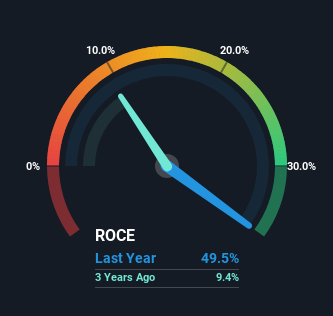If we want to find a stock that could multiply over the long term, what are the underlying trends we should look for? Typically, we'll want to notice a trend of growing return on capital employed (ROCE) and alongside that, an expanding base of capital employed. If you see this, it typically means it's a company with a great business model and plenty of profitable reinvestment opportunities. With that in mind, the ROCE of Booking Holdings (NASDAQ:BKNG) looks great, so lets see what the trend can tell us.
What Is Return On Capital Employed (ROCE)?
Just to clarify if you're unsure, ROCE is a metric for evaluating how much pre-tax income (in percentage terms) a company earns on the capital invested in its business. To calculate this metric for Booking Holdings, this is the formula:
Return on Capital Employed = Earnings Before Interest and Tax (EBIT) ÷ (Total Assets - Current Liabilities)
0.49 = US$6.3b ÷ (US$26b - US$13b) (Based on the trailing twelve months to September 2023).
So, Booking Holdings has an ROCE of 49%. That's a fantastic return and not only that, it outpaces the average of 9.2% earned by companies in a similar industry.
See our latest analysis for Booking Holdings

In the above chart we have measured Booking Holdings' prior ROCE against its prior performance, but the future is arguably more important. If you're interested, you can view the analysts predictions in our free report on analyst forecasts for the company.
What Does the ROCE Trend For Booking Holdings Tell Us?
You'd find it hard not to be impressed with the ROCE trend at Booking Holdings. The data shows that returns on capital have increased by 94% over the trailing five years. That's not bad because this tells for every dollar invested (capital employed), the company is increasing the amount earned from that dollar. Speaking of capital employed, the company is actually utilizing 37% less than it was five years ago, which can be indicative of a business that's improving its efficiency. If this trend continues, the business might be getting more efficient but it's shrinking in terms of total assets.
On a side note, we noticed that the improvement in ROCE appears to be partly fueled by an increase in current liabilities. Effectively this means that suppliers or short-term creditors are now funding 50% of the business, which is more than it was five years ago. And with current liabilities at those levels, that's pretty high.
The Bottom Line
In summary, it's great to see that Booking Holdings has been able to turn things around and earn higher returns on lower amounts of capital. And with a respectable 99% awarded to those who held the stock over the last five years, you could argue that these developments are starting to get the attention they deserve. So given the stock has proven it has promising trends, it's worth researching the company further to see if these trends are likely to persist.
If you want to continue researching Booking Holdings, you might be interested to know about the 2 warning signs that our analysis has discovered.
High returns are a key ingredient to strong performance, so check out our free list ofstocks earning high returns on equity with solid balance sheets.
Valuation is complex, but we're here to simplify it.
Discover if Booking Holdings might be undervalued or overvalued with our detailed analysis, featuring fair value estimates, potential risks, dividends, insider trades, and its financial condition.
Access Free AnalysisHave feedback on this article? Concerned about the content? Get in touch with us directly. Alternatively, email editorial-team (at) simplywallst.com.
This article by Simply Wall St is general in nature. We provide commentary based on historical data and analyst forecasts only using an unbiased methodology and our articles are not intended to be financial advice. It does not constitute a recommendation to buy or sell any stock, and does not take account of your objectives, or your financial situation. We aim to bring you long-term focused analysis driven by fundamental data. Note that our analysis may not factor in the latest price-sensitive company announcements or qualitative material. Simply Wall St has no position in any stocks mentioned.
About NasdaqGS:BKNG
Booking Holdings
Provides online and traditional travel and restaurant reservations and related services in the United States, the Netherlands, and internationally.
Good value with reasonable growth potential.
Similar Companies
Market Insights
Community Narratives



